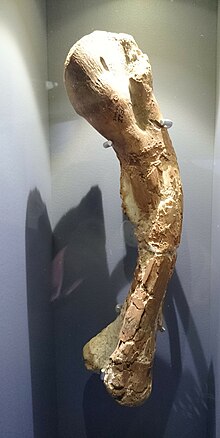Kangnasaurus

| Kangnasaurus Temporal range: Early Cretaceous, | |
|---|---|
 | |
| Thigh bone of cf. Kangnasaurus | |
| Scientific classification | |
| Domain: | Eukaryota |
| Kingdom: | Animalia |
| Phylum: | Chordata |
| Clade: | Dinosauria |
| Clade: | †Ornithischia |
| Clade: | †Neornithischia |
| Clade: | †Ornithopoda |
| Clade: | †Elasmaria |
| Genus: | †Kangnasaurus Haughton, 1915 |
| Species: | †K. coetzeei |
| Binomial name | |
| †Kangnasaurus coetzeei Haughton, 1915 | |
Kangnasaurus (meaning "Farm Kangnas lizard") is a genus of iguanodontian ornithopod dinosaur found in supposedly Early Cretaceous rocks of South Africa. It is known from a tooth and possibly some postcranial remains found in the early-Aptian Kalahari Deposits Formation.[1] It was probably similar to Dryosaurus.
Discovery and naming
[edit]
Kangnasaurus was named in 1915 by Sidney H. Haughton. The type species is Kangnasaurus coetzeei. The generic name refers to the Kangnas farm; the specific name to the farmer, Coetzee. Kangnasaurus is based on holotype SAM 2732, a tooth found at a depth of 34 metres in a well at Farm Kangnas, in the Orange River valley of northern Cape Province, South Africa.[2] The age of these rocks, conglomerates in an ancient crater lake, is unclear; they are thought to be from the Early Cretaceous (probably early-Aptian).[3] Haughton thought SAM 2732 was a tooth from the upper jaw, but Michael Cooper reidentified it as a lower jaw tooth in 1985.[4] This had implications for its classification: Haughton thought the tooth was that of an iguanodontid,[2] while Cooper identified it as from an animal more like Dryosaurus, a more basal ornithopod.[4]
Haughton described several other fossils as possibly belonging to Kangnasaurus. These include five partial thigh bones, a partial thigh bone and shin bone, a partial metatarsal, a partial shin and foot, vertebrae, and unidentified bones. Some of the bones apparently came from other deposits, and Haughton was not certain that they all belonged to his new genus.[2] Cooper was also not certain, but described the other specimens as if they did belong to Kangnasaurus.[4]
Classification
[edit]Kangnasaurus is usually regarded as dubious,[5][6] although a 2007 review of dryosaurids by Ruiz-Omeñaca and colleagues retained it as potentially valid, differing from other dryosaurids by details of the thigh bone.[3] Like other basal iguanodontians, it would have been a bipedal herbivore.[6]
At least two recent studies have found it to be an elasmarian instead of a dryosaurid.[7][8]
References
[edit]- ^ "Table 19.1," in Weishampel, et al. (2004). Page 417.
- ^ a b c d Haughton, Sidney H. (1915). "On some dinosaur remains from Bushmanland". Transactions of the Royal Society of South Africa. 5 (1): 259–264. Bibcode:1915TRSSA...5..259H. doi:10.1080/00359191509519723.
- ^ a b Ruiz-Omeñaca, José Ignacio; Pereda Suberbiola, Xavier; Galton, Peter M. (2007). "Callovosaurus leedsi, the earliest dryosaurid dinosaur (Ornithischia: Euornithopoda) from the Middle Jurassic of England". In Carpenter Kenneth (ed.). Horns and Beaks: Ceratopsian and Ornithopod Dinosaurs. Bloomington and Indianapolis: Indiana University Press. pp. 3–16. ISBN 978-0-253-34817-3.
- ^ a b c Cooper, Michael R. (1985). "A revision of the ornithischian dinosaur Kangnasaurus coetzeei Haughton, with a classification of the Ornithischia". Annals of the South African Museum. 95 (8): 281–317.
- ^ Sues, Hans-Dieter; Norman, David B. (1990). "Hypsilophodontidae, Tenontosaurus, Dryosauridae". In Weishampel, David B.; Dodson, Peter; Osmólska Halszka (eds.). The Dinosauria (1st ed.). Berkeley: University of California Press. pp. 498–509. ISBN 0-520-06727-4.
- ^ a b Norman, David B. (2004). "Basal Iguanodontia". In Weishampel, D.B.; Dodson, P.; Osmólska H. (eds.). The Dinosauria (2nd ed.). Berkeley: University of California Press. pp. 413–437. ISBN 0-520-24209-2.
- ^ Rozadilla, Sebastián; Agnolín, Federico Lisandro; Novas, Fernando Emilio (2019-12-17). "Osteology of the Patagonian ornithopod Talenkauen santacrucensis (Dinosauria, Ornithischia)". Journal of Systematic Palaeontology. 17 (24): 2043–2089. Bibcode:2019JSPal..17.2043R. doi:10.1080/14772019.2019.1582562. ISSN 1477-2019. S2CID 155344014.
- ^ Dieudonné PE, Cruzado-Caballero P, Godefroit P, Tortosa T (2020). "A new phylogeny of cerapodan dinosaurs". Historical Biology. 33 (10): 2335–2355. doi:10.1080/08912963.2020.1793979.
